Answering one of the biggest questions for an independent Wales

Llew Gruffudd
A widely held conception is that Wales independence will lead to higher taxes and service cuts.
It is inevitable, they say, due to Wales not being able to pay its way.
It is understandable that many of the public will fear this, given that this view is expounded by people who ought to know better.
The Commission on the Constitution says it.
In their ‘evidence’ led conclusions on independence, they say ‘whatever the size of Wales budget deficit, it will mean tax rises or service cuts.’
We are not allowed insight into this ‘evidence’ however.
Such a conclusion is a very large assumption and a very naive economic assertion.
A contributor to Nation Cymru and Senedd member, Mike Hedges argues similarly, I think I quote him correctly he says ‘I have no strong objection to independence except that it will lead to higher taxes and service cuts’. This again without offering any evidence in support.
This view is presented, ignoring the fact that belonging to ‘the Union’ leads to tax rises and public service cuts by the Westminster government, tax rises that don’t particularly benefit Wales and public service cuts that impact on the Wales public, imposed without Wales consent on a regular basis.
In any case this view is mistaken.
It is a view of independence, viewed through the prism of the present constitutional arrangements. The economics of an independent Wales is quite different.
An independent Wales will have economic and financial tools not available to the present Welsh government.
It will be a sovereign state, with a sovereign currency and a Central Bank.
There will be those, I know, who would wish to keep the pound sterling, however to make the necessary and urgent improvements to the Wales economy, will take significant investment. Investment that can only be raised by a sovereign currency.
An example. Wales has abundant green, renewable energy resources. So says the new Welsh Secretary, but more convincingly by a leading UK engineering publication, who states that ‘Wales has the greatest concentration of renewable energy resources, than perhaps anywhere on the planet’.
Three recent surveys by Carbon Trust, Marine Energy Wales and Crown Estates have identified, through offshore wind turbines, marine and tidal and floating turbines, 14 GigaWatts of installed capacity.
Wales in the ‘Union’
Under the present system the way it works is that The Crown Estates, only now with the new GB Energy tagging along, carries out surveys to provide data to private developers. It issues licenses and takes the license fees.
Then along comes the private developer, develops the sites, sells the energy and spirits the profits away, mostly to foreign lands.
The UK government gets the tax revenues from profits, with GB Energy looking to have a little stake, so they can have a little share of the profits.
And what does Wales get?. It gets some jobs. Amount unknown for Welsh workers, permanency unknown.
The Welsh Secretary describes the proposed scheme based in Port Talbot, as permanent jobs in manufacture and installation.
So permanent, temporary then.
There is no wealth creation in this exercise to significantly benefit Wales and whereas the effect of wealth creation can be shared throughout Wales, the creation of jobs cannot.
The alternative
An independent Wales would own the resources, can raise the finance through its Central Bank or its own bonds, could generate the energy (Through a publicly owned energy company, just like Norway) and sell it on the wholesale market, with 14 Gigawatts of capacity worth almost £10 billion a year at present wholesale prices.(The Crown Estates alone calculating a further 20 GigaWatt of potential for floating turbines off the Welsh coast)
It could alternatively sell the electricity internally at a discounted price, giving cheaper electricity to consumers, businesses and public services (it would still a have a tidy sum left over to sell)
Such a policy would still be wealth creating, with lower energy costs meaning more disposable income for the individual [ consumer spending being the biggest driver of economic growth ]
Lower costs for business, higher profits, a more attractive business environment and increased government corporate tax revenues for the Welsh treasury.
Lower costs for public services, hospitals, care homes, schools etc, meaning more money diverted to frontline services.
Just one example of the income an independent Wales would generate.
In addition
Plus there is the tax revenues and fees from existing energy generation that would now come to the Welsh exchequer.
The ability to deal with tax losses through avoidance, evasion and mismanagement, inherent in the present UK tax system, with Wales’ population share being £2 billion p.a.
In the medium term, there are gains from the new Wales ability to invest.
The Wales Governance Centre calculated that if Wales wage levels and therefore its tax revenues of income tax and NI, were at the levels of the UK average, it would add £5.4 billion per year to Wales government income.
This can be achieved by reversing the generations of lack of proper investment in skills and technology.
Studies by Nat West Bank and Deloittes found that if Wales productivity levels were at the UK level it would add £1.7 billion per year to Wales economy and if it reached the productivity of the best in Europe it would add £7.4 billion per year to Wales economy.
This would be done by reversing the historic underinvestment in innovation, research and development in Wales.
Just a sample of the benefits of investment, bringing large scale wealth gains to the nation.
A sovereign Wales with a sovereign currency and a Central Bank, would have the means of raising that investment.
So why on earth would an independent Wales need to raise taxes or cut services.
BBC
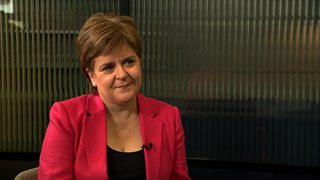
Nicola Sturgeon has predicted Scotland will become independent as part of a "wider shake-up" of UK governance, including Irish reunification.
The former first minister also suggested further devolution for Wales in the coming years as part of a "very healthy realignment of how the nations of the British Isles are governed and co-operate together”.
Speaking to BBC Scotland News to mark the 10-year anniversary of the 2014 independence referendum, the ex-SNP leader said she believed a Yes victory was "within grasp" on the eve of the vote.
Former Scottish Tory leader Ruth Davidson also claimed Sturgeon lost her opportunity to secure a second referendum by making her call "so fast, so hard and so early" after the 2016 Brexit vote.
Although the Yes side lost the referendum, the SNP enjoyed unprecedented electoral success in the decade since.
But it has also been rocked by the loss of 39 seats in July's general election, a public fallout between Sturgeon and Salmond and an ongoing police investigation into party finances.
Asked about her future hopes for independence, Sturgeon said: “I believe that, perhaps as part of a wider shake-up of UK governance, the reunification of Ireland, perhaps, more autonomy in Wales, that I think we will see Scotland become an independent country.
"I'll certainly campaign and advocate for that for as long as I've got breath in my body.”
She declined to predict whether she thought Irish reunification or Scottish independence would come first, adding: “It's not a matter for me, obviously, just as Scottish independence is not a matter for people in Ireland. But I do think that will happen."
In May 2022, 10 months before she stepped down as first minister, Sturgeon met Sinn Féin vice president Michelle O'Neill at her official Bute House residence in Edinburgh to discuss Brexit.
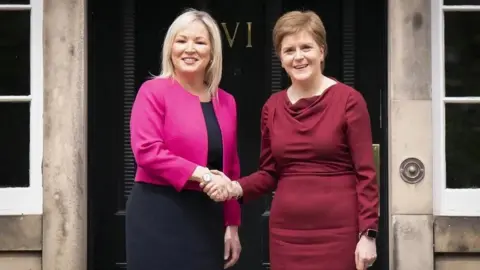
Nicola Sturgeon met Michelle O'Neill at Bute House House in 2022
Sturgeon said at the time that the departure from the EU had "brought to the fore some very fundamental questions" over governance in the UK.
O'Neill became Northern Ireland's first nationalist first minister in February, fuelling debate about the possibility of a border poll.
The 1998 Good Friday Agreement says that "the people on the island" should be able to exercise "their right of self-determination on the basis of consent, freely and concurrently given, North and South, to bring about a united Ireland", subject to the principle of consent in Northern Ireland.
The Northern Ireland Act 1998 states that “if at any time it appears likely" that a majority of those voting in a border poll would "express a wish that Northern Ireland should cease to be part of the United Kingdom and form part of a united Ireland”, the secretary of state will consent to a border poll.
It is not clear exactly how this process would come about.
Prime Minister Sir Keir Starmer said last year that an Irish unity referendum was "not even on the horizon".
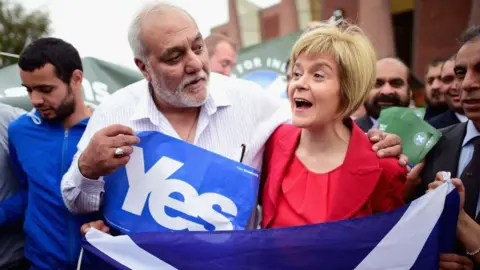
Nicola Sturgeon says she was "unusually" optimistic about the result of the referendum
Speaking to BBC Scotland News, Sturgeon described herself as a natural pessimist but said that was not the case come polling day, 18 September 2014.
"Unusually for me, in the final days, I was really optimistic," she told BBC Scotland News.
"I definitely felt that victory was within grasp.”
The then deputy first minister had a leading role in the Yes campaign and spent the summer touring around Scotland.
She returned to her home constituency of Glasgow Southside in the days before the referendum.
“The mood on the streets of Glasgow gave me perhaps a bit of an overly optimistic view of how the campaign was going right across the country," Ms Sturgeon said.
The No side ultimately won by 55.3% to 44.7%.
Sturgeon described the campaign as the "best of times and the worst of times".
“What I remember most about the campaign was just the energy, the sense of political awakening and in engagement that seemed to grip Scotland," she said.
Debate 'disaster'
Asked about any regrets, Sturgeon said she questioned whether the Yes campaign could have done some things differently.
She cited a united front from Westminster parties in opposition to proposals for a currency union, and described as a "disaster" the first TV debate between her predecessor Alex Salmond and Better Together chairman Alistair Darling
Darling was thought to have got the better of that exchange in early August 2014 after pressing Salmond on a plan B on currency plans.
Ms Sturgeon added: "Because these things didn't lead to a haemorrhaging of Yes support, I think we comforted ourselves that they hadn’t done any real harm.
"Looking back, I think these were moments that probably slowed down what was quite a steady shift of opinion from soft No undecided voters to the Yes side.”
Later in August, Salmond was widely considered to have outperformed his opponent in the second televised debate.
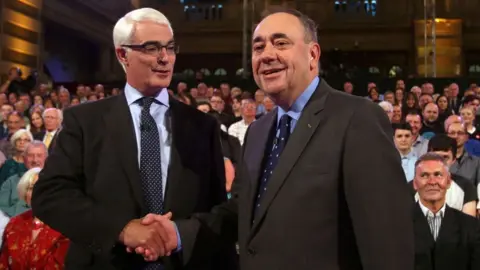
Alistair Darling and Alex Salmond faced off at the BBC debate in Glasgow's Kelvingrove Art Gallery and Museum
Two years after the independence referendum, the UK voted to leave the EU - despite Scotland voting in favour of Remain by 62% to 38%.
The SNP's subsequent demands for a second referendum were thwarted by Westminster, leading to criticism from within the Yes movement of Sturgeon's leadership.
The ex-SNP leader admitted she “didn't get everything right, far from it".
She said she "fervently" wished the SNP had made further progress on independence in the past decade.
'Westminster democracy denial'
Sturgeon insisted while it may not feel like the Yes campaign was “motoring forward”, levels of support were stable, and especially high among young people.
The former first minister added: “I came up against a brick wall of Westminster democracy denial in refusing the right of the Scottish people to choose their own future.
"Do I wish I had found a way around that? Yes, but that was the situation I faced.”
“Had that right to choose been secured, I believe Scotland would have voted Yes.”
Prof Sir John Curtice, president of the British Polling Council, told BBC Scotland News that support for independence had stabilised at just under 50%, and had been unaffected by the SNP's recent issues.
According to YouGov polling published on Tuesday, almost one in four (39%) of 16 to 24-year-old respondents said they would back Yes, with three in 10 (31%) in favour of No.
Yes was also more popular than No among 25 to 49-year-olds, although there was a majority for the union in older age groups.
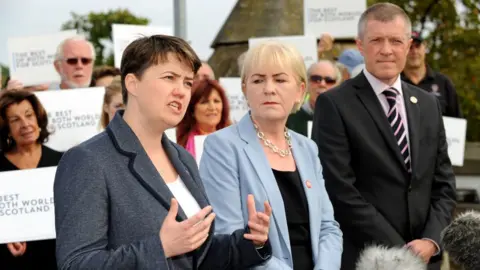
Ruth Davidson, left, campaigned alongside Scottish Labour leader Johann Lamont and Scottish LibDem leader Willie Rennie during the referendum
In the immediate aftermath, Sturgeon declared a fresh ballot on independence was “highly likely” - prompting her then deputy, John Swinney, to raise concerns about that strategy.
Former Scottish Conservative leader Ruth Davidson, who campaigned for Better Together a decade ago, said Sturgeon "probably" had an opportunity to secure a second independence referendum following the Brexit vote.
“Her appetite to go so fast, so hard and so early took that opportunity away from her," she told BBC Scotland News.
She suggested Sturgeon should have “put party politics aside” and tried to work with the UK government to “salvage” what it could from Brexit.
“And then maybe six months down the line said, you know what I can’t work with these people, Scotland has another opportunity, it has another choice, I think things could have been materially different," Davidson said.
'Overwhelmingly positive legacy'
The former Tory leader said that while she would have argued against a second referendum, it would have been "incredibly hard" if Sturgeon adopted a different approach.
Davidson claimed people who may have supported Sturgeon's call for another vote were "turned off by the idea that she wanted to use Brexit to immediately jump to this other thing".
Swinney, who succeeded Humza Yousaf as first minister in May, will address independence campaigners in Edinburgh to mark the anniversary of the referendum.
He is expected to say that while he was "devastated" by the result, he is "in no doubt" the referendum left "an overwhelmingly positive legacy" on Scotland.
No comments:
Post a Comment